Waiting for the Rain NCERT Solutions | English Poorvi Class 8 - New NCERT PDF Download
| Table of contents |

|
| Page No. 185 |

|
| Page No. 188 |

|
| Page No. 191-198 |

|
| Page No. 199-200 |

|
Page No. 185
Let us do these activities before we read.
I. Have you ever waited for the rains? Why?
Ans:
Yes, I have waited for the rains, especially during hot summer days. The rain brings coolness and freshness after long, hot weather. It also helps plants and trees to grow well.
II. How do you feel when it rains after a long time?
Ans:
When it rains after a long time, I feel very happy and refreshed. The smell of the first rain, the sound of raindrops, and the cool breeze make me feel relaxed and joyful.
III. Why do you think the farmers wait for the rains?
Ans:
Farmers depend on rain for watering their crops. Without rain, their fields remain dry, and they cannot grow food. That’s why rain is very important for their livelihood and survival.
IV. Discuss in groups what happens when you wait for something or someone for a long period of time.
1. How do you spend the waiting period?
2. What do you think about?
3. How do you feel?
Share your answers with your classmates and teacher.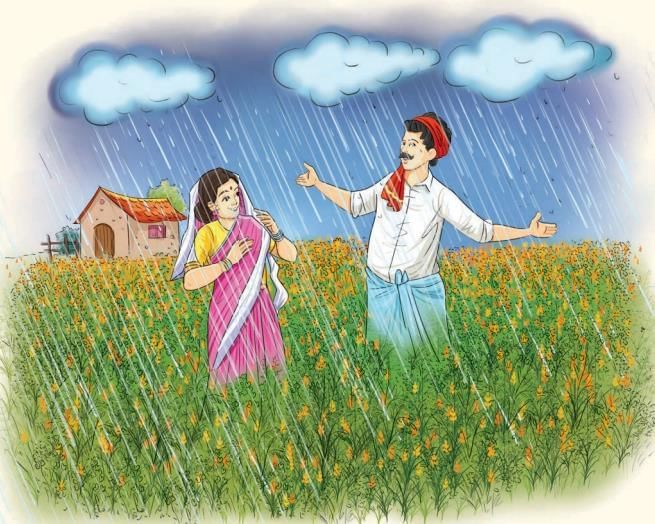 Ans:
Ans:
1. I try to stay calm and do other activities like reading, listening to music, or just watching the surroundings while waiting.
2. I think about when the person or thing will arrive and whether everything will go as expected.
3. Sometimes I feel anxious or impatient, but I also feel hopeful and excited, depending on the situation.
Share your answers with your classmates and teacher.
Page No. 188
Let us discuss
I. Complete the table given below. One example has been done for you. Share your answers with your classmates and teacher.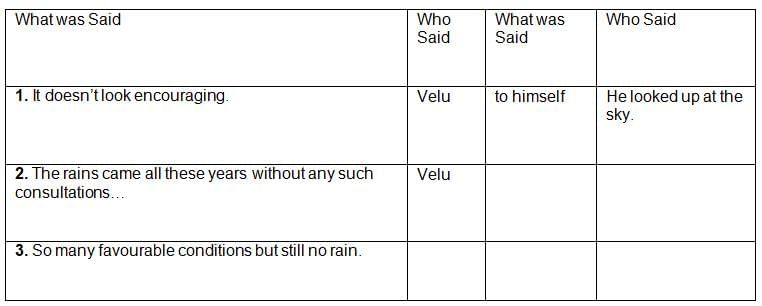
Ans: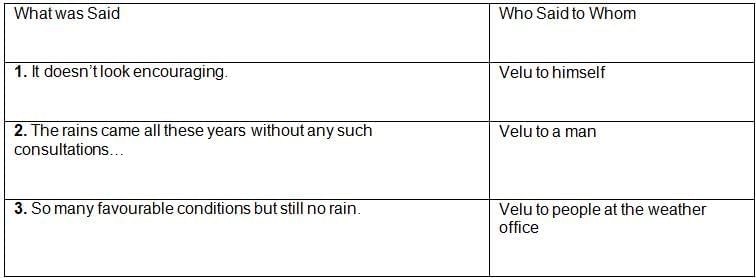
II. Do you think the old woman would help Velu? If yes, why? If no, why not?
Ans:
Yes, the old woman helps Velu—not by giving him rain, but by offering him a new way of thinking. She explains that just like people, the land also needs rest, which comforts and enlightens Velu during a time of hopelessness.
III. Will Velu’s wait continue or will it rain?
Ans:
Velu’s wait will not continue for long. By the end of the story, clouds begin to gather, and raindrops fall, indicating that rain has finally arrived, bringing relief and joy to Velu.
Page No. 191-198
Let us discuss
I. Complete the following statements given below with suitable reasons.1. Velu asked the old woman to stop smiling because _________________.
2. Velu said that it was hard not being able to work since_________________.
3. Velu was confused when the old lady said that the land needed rest because _________________.
4. The old lady said that it was good for the land when it didn’t rain as _________________
5. Velu ran home laughing and happy because _________________.
Ans:
1. there was no rain, and he felt there was nothing to smile about during such a difficult time.
2. he had been working continuously for six years and could not bear to sit idle.
3. he had never thought of land as something that needed rest like humans do.
4. it allowed the land to rest and rejuvenate after years of continuous cultivation.
5. he felt the cool breeze and saw raindrops, realizing that the long-awaited rain had finally come.
Let us think and reflect
I. Read the given extracts and answer the questions that follow.
Q1: “…Ican’t see how talking to astrologers will bring rain. ”
He decided to go to the weather office in the city and talk to someone. But the people at the weather office said they couldn’t really tell him when the sky would gather clouds and bring rain. “We are at a loss ourselves!” they exclaimed. “So many favourable conditions but still no rain. Very odd!”
(i) What does the fist line of the extract tell us about Velu’s beliefs?
Ans:
It shows that Velu is a practical and rational person. He does not believe in superstitions or relying on astrologers.
(ii) Complete the following sentence with a suitable reason.
Velu is determined to seek information about the rain because ___________________. (he was at a loss of words/he wants to find a practical solution to the drought affcting his farm)
Ans:
he wants to find a practical solution to the drought affecting his farm.
(iii) Complete the table with reference to Velu’s weather offi visit.
Ans:
(iv) Complete the following sentence with a suitable option.
The absence of rain despite favourable conditions, shows _________________.
A. lack of astrological knowledge
B. ineffectiveness of farmers like Velu
C. delay in understanding the weather
D. unpredictability of nature
Ans: (D) unpredictability of nature
Q2: “The soil, the land, the earth… shouldn’t someone let the land rest a bit?” the old woman said, softly, smiling.
“Rest? Let the land rest? I don’t understand, ” Velu looked at her, a little puzzled.
“Yes, my son, that is the difficulty. You don’t realise that the earth is old…”
(i) The old woman’s advice was accompanied with a soft tone and a smile. What does that tell us about her?
Ans:
It shows that she is wise, gentle, and calm. She speaks kindly, with care and understanding.
(ii) Fill in the blank with the correct option from those given below.
The old woman’s advice _________________
Velu, at that moment.
A. failed to impress
B. confused
C. scared
D. made sense to
Ans: (B) confused
(iii) State one thing about the old woman when she referred to Velu as ‘my son’, while offering advice.
Ans:
It shows that the old woman was affectionate, motherly, and caring in her attitude toward Velu.
(iv) Complete the following sentence with a suitable explanation.
The ‘difficulty’ that the old woman mentions is due to the fact that _________________
Ans:
people like Velu fail to understand that even the earth needs rest after constant use.
II. Answer the following questions.
Q1: How does the old woman convey Nature’s wisdom to Velu?
Ans:
The old woman explains that just as people need rest, the land also needs time to recover. She personifies the earth, showing that it has worked for centuries and must be allowed to breathe and rejuvenate.
Q2: The writer says, The fields lay untended…’ Why couldn’t the farmers tend to their fields in the absence of rain?
Ans:
Without rain, the soil became dry, cracked, and hard. It was impossible to plough, sow seeds, or grow any crops. Hence, the farmers could not tend to their fields.
Q3: Support the old woman’s perspective that the land needs rest just like people do.
Ans:
Just as continuous work tires human beings, the earth too becomes exhausted after constant cultivation. Leaving it fallow helps it restore nutrients and moisture. This rest helps in better crop growth later.
Q4: What can be inferred about Velu’s character based on his reaction to the drought?
Ans:
Velu is hardworking, sincere, and deeply connected to his land. He feels helpless and anxious when he cannot work. His actions show that he is responsible and practical, though initially impatient.
Q5: What does the story suggest about the life of farmers and their relationship with nature?
Ans:
The story shows that farmers are closely tied to the rhythms of nature. Their lives depend on natural events like rainfall. It also suggests that farmers must learn to respect nature’s cycles, including times of rest.
Q6: How might the rest and care of land contribute to a balanced and sustainable ecosystem?
Ans:
Resting the land prevents soil exhaustion, preserves moisture, and helps maintain its fertility. This practice supports healthy crop cycles and ensures long-term productivity, contributing to a sustainable farming ecosystem.
Let us learn
I. Solve a crossword using picture and word clues. All clues are related to the words from the text that are connected to weather or agriculture.
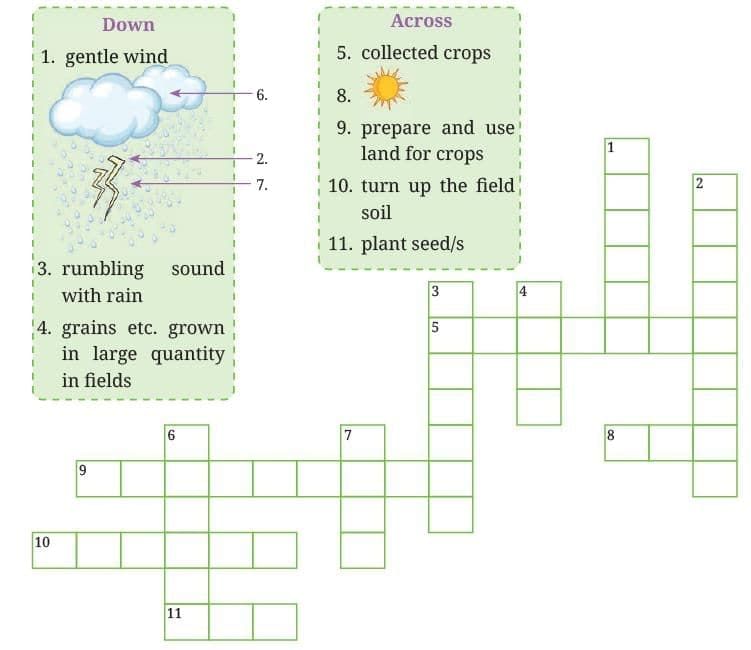 Ans:
Ans: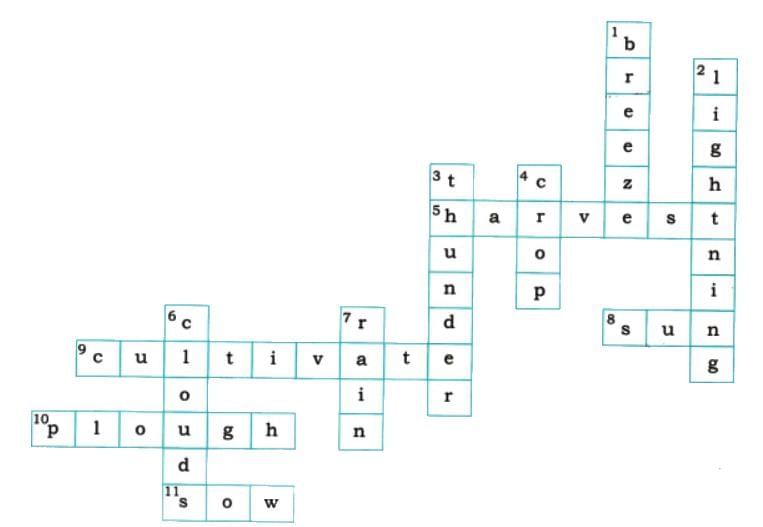
II. The text uses words like ‘piece,’ “weather,’ ‘son,’ and ‘rain’. These words are the same as other words that are spelt differently— peace, whether, sun, and reign.
Words that are pronounced the same as other words but differ in meaning or in spelling are called homophones.
Now, complete the paragraph by filling in the correct option of homophones given in the brackets.
The farmer looked at the sky and wondered 1. ________________ (weather/whether) the clouds would fially bring rain. He sat down on the ground, breaking a small 2. ________________ (piece/peace) of roti for his meal. The 3. ________________ (plain/plane) filds stretched endlessly before him, completely dry. He thought about how he could 4. ________________ (sell/cell) his last sack of grain to buy some essentials for his family. Without the rains, it didn’t 5. ________________ (seam/seem) possible to grow another crop this season. Despite his worries, he smiled, knowing that every farmer hopes for the next 6. ________________ (rain/reign) by nature to bring life back to the land.
Ans:
1. whether
2. piece
3. plain
4. sell
5. seem
6. rain
III. Choose the correct meanings from the given options for the underlined words or phrases in the following sentences.
Q1: Being annoyed, she muttered something which nobody heard.
(i) spoke in a low voice
(ii) spoke slowly
(iii) spoke angrily
Ans:
(i) spoke in a low voice
Q2: At the new work place, Riya felt forlorn for a week.
(i) upset and irritated
(ii) angry and bitter
(iii) sad and neglected
Ans: (iii) sad and neglected
Q3: When all his friends had gone, he was at a loss because he did not know what to do. .
(i) confused
(ii) shocked
(iii) lonely
Ans: (i) confused
Q4: When the little child saw her father, her eyes sparkled.
(i) glowed dimly
(ii) showed joy
(iii) opened wide
Ans: (ii) showed joy
IV. Match each word (adjective) in Column 1 with a word (noun) that collocates in Column 2. Write the adjective-noun collocation in Column 3. One example has been done for you.
Ans:
V. Underline the verbs and identify the forms of tenses for the following sentences from the text.
1. Oh, it is hard not to be able to work…
2. …I am too old.
3. What are you smiling at, Amma?
4. But my son, that is what I am talking about.
5. The earth has worked for years, centuries…
6. I have worked hard and honestly.
Ans:
1. Oh, it is hard not to be able to work…
(Simple Present)
2. …I am too old. (Simple Present)
3. What are you smiling at, Amma? (Present Progressive)
4. But my son, that is what I am talking about. (Present Progressive)
5. The earth has worked for years, centuries… (Present Perfect)
6. I have worked hard and honestly. (Present Perfect)
The forms of tenses in the given statements are Simple Present Tense (1 and 2), Present Progressive Tense (3 and 4) Present Perfect Tense (5 and 6).
Now, fill in the blanks with the correct form of Simple Present, Present Progressive or Present Perfect tenses of the verbs given in brackets.
Ravi (i) __________ (be) a farmer who (ii) __________ (practise) crop rotation on his land. Each season, he (iii) __________ (plant) different crops to maintain the soil’s health. This year, he (iv) __________ (grow) legumes, which help restore the nutrients in the soil. Over the years, Ravi (v) __________ (learn) that planting the same crop repeatedly (vi) __________ (deplete) the soil, making it less fertile. By rotating crops, he (vii) __________ (keep) the land productive and fertile. He (viii) __________ (see) a noticeable improvement in his yields since adopting this method. Now, Ravi (ix) __________ (share) his knowledge with other farmers, explaining how crop rotation (x) __________ (benefit) both the soil and their harvests.
Ans:
(i) is
(ii) practices
(iii) plants
(iv) will grow
(v) has learnt
(vi) depletes
(vii) keeps
(viii) has seen
(ix) is sharing
(x) benefits
VI. Study the highlighted words in the following sentences from the text.
- The rains came all these years without any such consultations.
- So many favourable conditions, but still no rain.
- Every day they hoped that the rains would come.
- But this year turned out to be diffrent.
- This is the fist season in five, no, six years that I have not sown, nor ploughed.
- We ought to talk to some astrologers.
- I have only done what any hard-working farmer would do.
- Velu looked at her, a little puzzled.
- She takes care to give her children the rest they need…
- Velu felt a cool breeze on his back.
The highlighted words or phrases that come before a noun but do not describe them are called determiners.
Let us learn the use of some common determiners.
- Articles: a, an, the
These are used to introduce nouns. - Demonstrative Determiners: this, that, these, those
These are used to point out specifi items. - Possessive Determiners: my, our, your, his, her, its, their, one’s
These indicate ownership or relationship. - Defiite Numeral Determiners: one, two, three, etc.
These specify exact quantities. - Indefiite Numeral Determiners: some, any, no, all, much, many, few, less, several, little and few
‘Some’ is used in affiative sentences, while ‘any’ and ‘no’ are used in negative and interrogative sentences.
‘All’ refers to the entirety of a group.
‘Much’ and ‘many’ denote large quantities of uncountable and countable nouns, respectively.
‘Few’ indicates a small number, ‘less’ refers to a smaller quantity, and ‘several’ means more than two but not many.
‘Little’ means not much, ‘few’ means not many. Use ‘a little’ and ‘a few’ to convey a positive sense. - Distributive Determiners: each, every, either, neither
‘Each’ refers to individual items or people, ‘every’ refers to all items or people collectively.
‘Either’ means one of two options and ‘neither’ means not one of the two options.
Now, fill in the blanks by choosing the correct determiner from those given in the brackets.
It was 1. ________ (a/an) rainy afternoon, and 2. ________ (a/the) sky was thick with dark clouds. Mala noticed a large puddle quickly forming in front of 3. ________ (her/their) house. Excited, she called for her brother to join her, knowing that both of them always loved playing in 4. ________ (a/the) rain. While jumping from 5. ________ (some/one) puddle to another, Mala spotted 6. ________ (few/a few) snails slowly creeping along the wet sidewalk and pointed them out to her brother. With 7. ________ (each/every) jump, the sound of both 8. ________ (her/their) squeals and laughter was heard through the soft patter of raindrops. Though they were fully drenched 9. ________ (either/neither) siblings minded it. It had been a perfect rainy day.
Ans:
1. a
2. the
3. her
4. the
5. one
6. a few
7. each
8. her
9. neither
Let us listen
I. Listen to the weather forecast. As you listen, fill in the blanks with the exact word you listen to. (Refer to NCERT Textbook Page 204 for Transcript)
1. Delhi will mostly have a ___________ sky with light rain.
2. Moderate rain is likely to happen in ___________.
3. Kolkata is likely to have a maximum temperature of around
___________ °C.
4. There is a chance of a ___________ in Chennai.
5. Bengaluru will have a ___________ temperature of 29 °C.
6. Taking an ___________ is advisable because of the weather conditions.
Ans:
1. cloudy
2. Mumbai
3. 34
4. thunderstorm
5. maximum
6. umbrella
Let us speak
I. Here is a tongue twister about ‘weather’. Practice saying it as fast as you can.
Whether the weather be fine, or whether the weather be not, whether the weather be cold, or whether the weather be hot, well weather the weather, whatever the weather, whether we like it or not.
Ans:
Practise it yourself.
II. Rain has arrived after a long dry spell on the Earth. Imagine the Rain and the Earth have a conversation. Work in pairs and present the role-play.
You may use the hints in the table given below.
You may start the conversation in the following way.
Rain: Greetings, Earth! It’s been awhile since we’ve met. How have you been?
Earth: Hello Rain! I am so glad to see you.
To continue the conversation, use the hints given below.
Ans:
Sample Role-play Script
Rain: Greetings, Earth! It’s been a while since we’ve met. How have you been?
Earth: Hello Rain! I am so glad to see you.
I’ve been dry and tired. Eveiything on me — the trees, the rivers, the crops — they’ve all been waiting for you.
Rain: I’m truly sorry I took so long. My journey from the ocean to the sky and back to you is long and sometimes unpredictable. But I’ve finally arrived!
Earth: Thank you for returning. Your water brings life to my soil. Crops will grow, rivers will flow, and the forests will bloom again.
Rain: I promise to return regularly and on time next year. Ill continue to bring your people and plants the water they need.
Earth: You’re always welcome, Rain.
Come, let’s celebrate with the rivers, forests, and all the people. You are a blessing to us all.
Rain: I’m glad I can help. I’ve missed being here too.
- Use voice modulation to show emotion (joy, relief, gratitude).
- Practise with a partner and present it in front of the class.
- Add gestures or simple props if desired for a fun performance.
Page No. 199-200
Let us write
I. You have observed the difficulties faced by the people in your neighbourhood due to scarcity of water especially during the summer months. Write a letter to the Councillor of your Municipal ward, requesting her/him to set up a rain water harvesting unit. Provide suggestions to address the issue.
Remember to
- use formal language
- keep sentences short and to the point
- state the purpose clearly and concisely
- give relevant details
Format and Layout: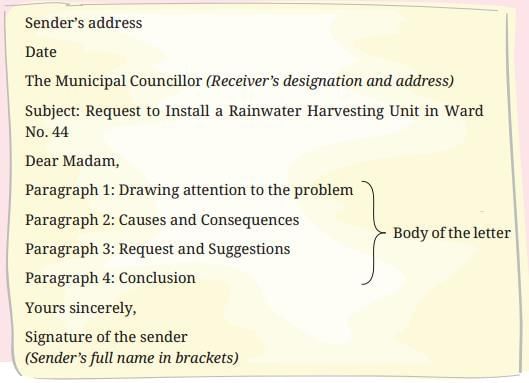 Ans:
Ans:
123 Green Lane
Vikas Nagar
New Delhi – 110018
19 May 20XX
The Municipal Councillor
Ward No. 44
New Delhi Municipal Council (NDMC)
New Delhi – 110001
Subject: Request to Install a Rainwater Harvesting Unit in Ward No. 44
Dear Madam
I am writing to draw your kind attention to the severe water scarcity being faced by the residents of our neighbourhood, especially during the summer months.
This scarcity is caused by irregular rainfall, excessive usage, and poor storage systems. As a result, we struggle to meet our daily water needs for drinking, cooking, and cleaning. People are forced to depend on water tankers, which are often irregular and expensive.
I humbly request you to set up a rainwater harvesting unit in our locality. This system will help us collect and store rainwater, reduce dependency on groundwater, and ensure sustainable water supply. Public awareness campaigns and community involvement can further support this effort. Rooftop collection systems, recharge pits, and community tanks can be good starting points.
We look forward to your prompt action and support in making our ward water-efficient and eco-friendly.
Yours sincerely
Ravi Sharma
Let us explore
I. Rest is very important for us to function in a proper manner. Even the Earth needs rest. This is known as fallowing.
Read the facts given below related to fallowing:
- A fallow year refers to leaving the land without sowing for one, or several vegetative cycles.
- This is done to allow the land to recover its nutrients and retain moisture. It also helps to avoid spreading of diseases and controlling pests.
- The sustainable land management method has been applied for centuries, wherein a field is divided into two halves—one is planted with crops while the other remains unplanted. Then, the process is reversed in the following year.
Ans: Do it yourself.
II. Find out from your Vocational Education teacher about Agriculture as a vocation and other related vocations, such as horticulture, etc.
Ans:
Question to be asked by student from her/ his Vocational Education Teacher:
What are some vocations related to agriculture?
Expected Answer from the teacher: Besides farming, vocations related to agriculture include:
- Horticulture: Growing fruits, vegetables, flowers, and ornamental plants.
- Dairy farming: Rearing animals for milk production.
- Poultry farming: Rearing birds like chickens and ducks for eggs or meat.
- Sericulture: Silk production through silkworm rearing.
- Apiculture: Beekeeping for honey production.
- Agri-business: Selling agricultural tools, seeds, and fertilizers.
- Soil conservation: Working on protecting and enriching soil health.
|
60 videos|520 docs|57 tests
|
FAQs on Waiting for the Rain NCERT Solutions - English Poorvi Class 8 - New NCERT
| 1. What is the main theme of the article "Waiting for the Rain"? |  |
| 2. How does the article illustrate the relationship between farmers and nature? |  |
| 3. What role does weather play in agricultural practices as described in the article? |  |
| 4. Can you explain the significance of rain in the context of rural life mentioned in the article? |  |
| 5. In what ways do the farmers express their feelings about waiting for rain in the article? |  |















